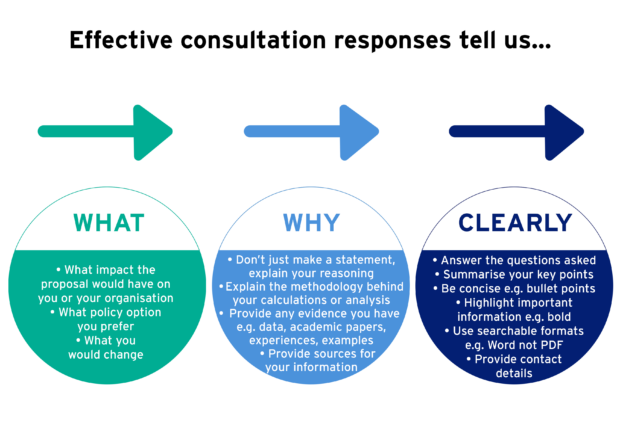MHRA regularly consults its stakeholders on many issues.
As Head of Economics I use the consultation responses to gather new evidence to see if we’ve got our policy right, or if we need to change it. It is extremely satisfying when I get a response that provides good evidence, and I can use that to change the direction of a policy, or even just tweak it a little to better protect the public’s health, or lower the cost to business.
However, impactful consultation responses aren’t as common as I’d like. Many respondents don’t explain the reasons behind their thinking or present evidence to substantiate their response, so I can’t understand where they’re coming from, and I can’t infer policy implications from what they’ve said. This wastes the respondent’s time, and mine.
So I commissioned research from Nicola Coulson, MHRA fast-streamer, to explore this problem. We needed to identify what prevents consultation respondents from providing good evidence and to see what we can do to support respondents in getting their point across.
Nicola conducted 22 interviews with external stakeholders who respond to consultations, and civil servants who conduct consultations. Through these interviews we identified factors which differentiate good and bad responses. Using the research we designed a simple infographic tool to assist consultation respondents in submitting responses.

The research has now been published, and you can read it on the MHRA website. I’m pleased to say that it is a short, clear, jargon free read. I would recommend it to anyone who is thinking of responding to MHRA, or wider government, consultations.
As well as producing guidance for consultation respondents, the research has made some recommendations for the MHRA and the Civil Service. As a result of this MHRA has created a role for a consultation advisor, who will be responsible for installing the lessons coming from this research, and harmonising practice across MHRA.
On a more personal level being part of the research has given me much more empathy for people responding to consultations. Previously I had assumed a respondent knew what they thought, and the main challenge was just drafting in the right way and submitting it on time. Now I recognise that the respondent has to interpret our questions, gather information from far and wide across their organisation, resolve differences between teams, and get the response cleared and submitted before the consultation closes. So in future I will adjust my approach to consultations. I will focus on making it as easy as possible for respondents to give us the right information in the right way.
Some quite small changes can make a huge impact on how we communicate with one another. If MHRA and industry heed the messages in this research, we can improve the quality of the policy in the MHRA.
I look forward to working with more effective consultation responses in future.
Let me know in the comments what you think of the research and how you think MHRA could improve the way it consults.